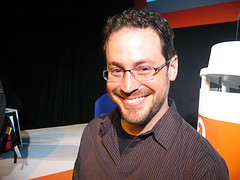They're Gonna Put Me in the Movies

I haven't seen the film Paranormal Activity, but I did fill out a web form requesting that it be shown in my town. That's apparently enough for me to earn a spot in the credits of the film when it comes out on DVD.
I got an email inviting me to add my name to the credits, and if you click the link the invitation will be extended to you as well.
After I filled out the form, I was shown a list of other people who are going to be credited. The list was 3,346 people long when I saw it, and included such film industry luminaries as Jeff "PocketPair77" Sugimura, Nisha Hookerpie, Michael "Shrek" Taylor, Daniel "Better Than Josh Levine" Newman and Jerry S 956 aka IVVI Wargasm. No, I don't know who those people are either.
It's not clear what my credited job is, but if there were any animals or insects involved in the production I could wrangle them.
I'm hoping this credit helps me get into IMDB.
Is Miss Farrell Crazy on Mad Men?

I've become an obsessed viewer of Mad Men this season, catching each episode on its first Sunday night airing and hitting the web afterwards to read reactions. The best place to do this is the blog of New Jersey Star-Ledger television critic Alan Sepinwall, who posts an extremely long critique of each episode that attracts hundreds of interesting comments.
For several weeks, Sepinwall's readers have been increasingly critical of Suzanne Farrell, the outspoken young teacher who is Don Draper's latest hoochie mama. They think she's "cuckoo bananas" and a Fatal Attraction waiting to happen, which I find to be a weird reaction.
I posted a comment along those lines Sunday night, asking this question, "When did an assertive woman who is open and direct about her feelings and clear about her needs equate to crazy? Particularly in the world of Mad Men where the cost of repression is made so abundantly clear."
Sepinwall responded: "I think the drunk-dialing scene in 'The Fog' and the eclipse scene in 'Seven Twenty Three' provided enough in-show evidence for people to at least wonder if something is off about Miss Farrell, if not know for sure that there is."
Though subsequent episodes may prove me wrong, I think Farrell makes viewers tense because she's more self-aware than any of Draper's previous conquests. This trait makes it harder to believe that once they're over, she'll go quietly into that good night.
But it does not make her a bunny boiler. Farrell has never done anything that would call her sanity into question more than, say, masquerading as another man and continuously pursuing empty sexual relationships that could destroy your family.
If you show up next Sunday night on Sepinwall's blog, make note of his rules: Don't post spoilers or talk at all about the preview of the next episode.
Readers Have Never Paid for the News
British commentator Libby Purves has become the latest veteran journalist to declare that Internet freeloaders are ruining the newspaper business and they need to start paying for the media they consume, or else trained professionals like her will take their inverted pyramid and go home. In response to the switch of London's Evening Standard to free circulation, Purves writes:
Call me a reactionary, call me a Murdoch lackey, but the fact is that, after a vague flirtation with the concept that "information wants to be free" and years of internet surfing, I feel a sense of revolt.
It's been fun: like a jammed fruit machine spewing free tokens or a whisky-galore shipwreck. But it's got to stop. Content -- whether music, films, pictures, news or prose -- can't be free and flourish. The music and movie industries are fighting: journalism, after the ego trip of gaining millions of online readers, is following. It has to. There is no alternative.
The labourer is worthy of his hire, time is money, pay peanuts and you get monkeys. Pay nothing and you get dumb (or worse, venal) monkeys. Nothing costs nothing.
Whenever I read an unhappy rant like this from a journalist, it makes me wonder how they could know so little about where their paycheck is coming from. Newspaper readers have never paid for their news, outside of rare exceptions like the Wall Street Journal and trade publications such as Variety. Daily newspapers derive most of their revenue from advertisers. Lauren Rich Fine, a former newspaper industry analyst with Merrill Lynch, estimated that historically, subscriptions generated 20 percent of a newspaper's revenue and the other 80 percent came from classifieds and display advertising.
So back in the glory days of newspapers before the Internet ruined everything, readers were getting their journalism at a steep discount paid for by advertisers. Newspapers were the biggest game in town for local classifieds and department store ads and papers enjoyed extremely fat profit margins because of it. But if there's one thing that a journalist should be in a position to know, it's the fact that times change.
Even today, Internet freeloaders aren't getting their news for free. Nine different ads are running on the page that includes Purves' Times of London column.
The real issue here is that online ads aren't generating the kind of revenue that other ads did for decades, so it's an extremely rough time for the industry. But placing the blame on readers for being cheapskates is extremely misguided. We've always gotten the news at a price much lower than the cost of reporting it.
Credits: The photo of the Evening Standard van by Oxyman is available under a Creative Commons license.
Dear Derek Powazek: SEO is a Legitimate Profession
I'm a huge fan of the web designer and magazine publisher Derek Powazek, but I couldn't disagree more with his rant that calls all search engine optimization (SEO) a con game:
Search Engine Optimization is not a legitimate form of marketing. It should not be undertaken by people with brains or souls. If someone charges you for SEO, you have been conned. ...
The problem with SEO is that the good advice is obvious, the rest doesn't work, and it's poisoning the web.
I tried to respond on his blog, but he's closed comments. Saying that good SEO is obvious is like saying that good web design is obvious. Lumping all SEO consultants with scammers and spammers is unfair to thousands of people who do that work honorably.
 The kinds of things he's saying about SEO were being said about blogs back when mass-audience tools like Blogger and Movable Type helped popularize the medium. The publishing style of blogs -- short frequent items with category links and heavy link exchange among bloggers -- had a considerable SEO benefit and helped blogs rise to the top of search results, making a lot of static-site publishers angry.
The kinds of things he's saying about SEO were being said about blogs back when mass-audience tools like Blogger and Movable Type helped popularize the medium. The publishing style of blogs -- short frequent items with category links and heavy link exchange among bloggers -- had a considerable SEO benefit and helped blogs rise to the top of search results, making a lot of static-site publishers angry.
If I'd been able to comment, I would have posed this question to Derek: Have you ever tried to help a small business launch a new site and be discovered by potential customers on search engines? It's a difficult task that's vital to their livelihood. The black-hat junk that he slams makes it even harder for them.
Good SEO is essential to these businesses, which aren't in a position to simply "Make something great. Tell people about it. Do it again," since they are not web auteurs with a 14-year track record of launching great sites. Try explaining to a company that provides environmental cleanup services across two states that it doesn't need SEO because it just has to create something cool and tell people. Or a local chiropractor. Companies throw hundreds or even thousands of dollars at yellow-page publishers for a single ad because their need to be found by customers is so strong. A lot of people never look at those tree-killing phonebooks anymore. They use Google.
As obvious as Derek believes SEO to be, he missed one of the most basic techniques by omitting a title in the URL of his blog posts.
I'm not an SEO consultant, but I've learned about the techniques over the years because I run a one-man shop that can't afford advertising. Most SEO techniques are about learning how Google works, not trying to game it inappropriately. The first thing I would hire, if my business could afford it, is an expert in SEO. That talent pays for itself more quickly than any other skill in web publishing.
Photo of Derek Powazek taken by Isriya Paireepairit and redistributed under a Creative Commons license.
Saving Bandwidth on RSS Feed Details
With the current interest in rssCloud and PubSubHubbub (PuSH), I've been thinking about all the bandwidth that's consumed by the RSS elements that describe the feed. When a client requests an RSS feed 10 times in one day, it gets the basic details of the feed over and over again. When clients request the Workbench feed, they get 1,800 characters containing optional RSS elements that I haven't changed in years, except for the PuSH element I added last month. Workbench has 1,900 feed subscribers, so if they average 10 checks a day, they're consuming 32 megabytes every day on information they know already.
James Holderness directed me to RFC3229+feed, a method to request partial RSS feeds that omit elements that a client has already seen. That's useful and has been adopted by some feed publishers and clients, but as far as I can determine, the approach still sends all of the channel elements that describe the feed itself. I wanted to float an idea here to see if it would be useful:
<rssboard:feedDetails>
http://ekzemplo.com/feedinfo.rss
</rssboard:feedDetails>
This channel-level RSS element identifies a URL that contains the full details about the feed. The details would be expressed as an RSS feed without any item elements.
An optional ttl attribute could contain the number of days the publisher would like clients to cache the information before checking it again:
<rssboard:feedDetails ttl="30">
http://ekzemplo.com/feedinfo.rss
</rssboard:feedDetails>
A feed publisher who wished to make use of this could move all channel elements except for title, link, description and atom:link to the detail URL. Title, link and description are required in RSS, and atom:link identifies the feed's URL so it can't be moved.
World's Oldest Man: 'Life is Short'
Walter Breuning, the world's oldest man at 113 years, gave a pretty amazing birthday speech Monday at the Montana retirement home where he lives:
Life begins each morning whether we have succeeded or failed or just muddled along. Life is a school to learn, not to unlearn.
Life is the creation by God and if you would know God, be not a solver of riddles. Look about you and you shall see him playing with your children. Look into the air and you shall see him walking in the clouds, out-stretching his arms in the lightning and descending in rain. You shall see him smiling in flowers, then rising and waving his hands in trees.
Life is a great teacher of truth. What is truth to one is not truth to another. What is true in one country may be false in another.
Life is short but the influences of what we do or say is immortal. There needs to be much more of the spirit of fellowship among us and more forgiveness. The power of gentleness is little seen in the world.
Remember that life's length is not measured by its hours and days, but by that which we have done therein. A useless life is short if it lasts a century.
There are greater and better things in us all if we would find them out. There will always be in this world -- wrongs. No wrong is really successful.
The day will come when light and truth and the just and the good shall be victorious and wrong as evil will be no more forever.
Life itself teaches us to best prepare for that future which we hope for and for that journey to that land un-known, not made by hands.
Everything just is beautiful; everything beautiful ought to be just.
The mystery of the world remains unknown. Our maker alone is the key which unlocks all the mysteries of the universe.
The world is neither a prison nor a palace of ease, but rather for instruction and discipline.
This world has been good to all of us.
PubSubHubbub is a Lot Easier Than It Sounds
I've begun digging into PubSubHubbub (PuSH), the real-time RSS update protocol created by Brad Fitzpatrick and Brett Slatkin of Google and Martin Atkins of Six Apart. I was under the impression that it's harder for RSS publishers to use than the RSSCloud Interface, but that isn't the case. The specification is simple and precisely written, adopting conventions like RFC 2119 that make a spec considerably easier to understand, and it communicates using basic HTTP requests.
 I wrote the software that runs the Drudge Retort, so I decided to add PuSH support to it this morning to see how it works. PuSH delegates all the work required for update notification to a server called a hub. Google offers a hub at http://pubsubhubbub.appspot.com/ that's free for use by all feed publishers, so I'm relying on it.
I wrote the software that runs the Drudge Retort, so I decided to add PuSH support to it this morning to see how it works. PuSH delegates all the work required for update notification to a server called a hub. Google offers a hub at http://pubsubhubbub.appspot.com/ that's free for use by all feed publishers, so I'm relying on it.
First, I added a link element to the Retort's RSS feed that identifies the feed's update hub:
<atom:link rel="hub" href="http://pubsubhubbub.appspot.com" />
Because this element comes from the Atom namespace, I had to make sure it was declared in the feed's top-level RSS element:
<rss version="2.0"
xmlns:dc="http://purl.org/dc/elements/1.1/"
xmlns:atom="http://www.w3.org/2005/Atom"
xmlns:sitemap="http://www.sitemaps.org/schemas/sitemap/0.9">
The bold portion is the Atom declaration. I already was using an Atom element in the feed, so I didn't need to change this.
When a new story is posted on the Retort, the PuSH hub must be notified that a change has occured. This is handled by sending a ping to the hub with the URL of one or more feeds that have been updated.
I've written an open source Weblog Pinger library in PHP, so I upgraded it to support these pings. A PuSH ping employs HTTP requests (REST) instead of XML-RPC, the protocol used by Weblogs.Com and similar services. I wrote a new function, ping_rest(), that can send a ping to any PuSH server.
By the time I was done, I'd spent an hour on the code and a few hours testing it out. So now when I post a new item on the Retort, Google's PuSH server sends the full text of the item to all readers that support the protocol. This is faster and simpler than RSSCloud, which tells readers to request the feed again.
To give you an idea of how fast PuSH can be, when I posted a new story on the Retort, it showed up 20 seconds later on FeedBurner, one of the first RSS services to support the protocol.


